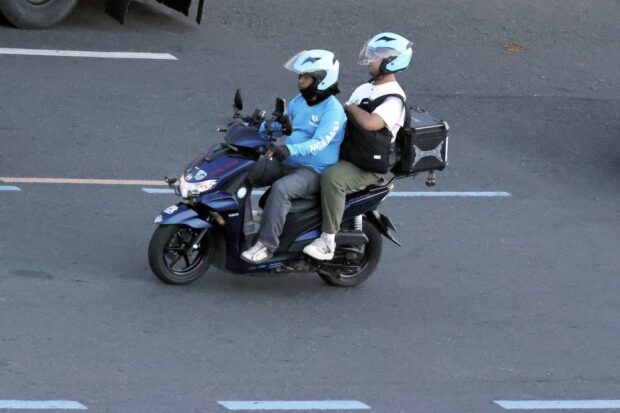
FOR PROVINCIAL USE ONLY Amid concerns that 8,000 new slots for motorcycle taxis will worsen traffic in Metro Manila, the Land Transportation Franchising and Regulatory Board says that these will be required to operate in the provinces. —INQUIRER FILE PHOTO
MANILA, Philippines — House Bill (HB) No. 10424 or the proposed Motorcycles-for-Hire Act, which seeks to regulate the operation of motorcycle taxis, has been approved by the House of Representatives on the third and final reading.
HB No. 10424 was approved during Tuesday’s plenary session, with 200 lawmakers voting in the affirmative, one in the negative, and zero abstentions.
According to Speaker Ferdinand Martin Romualdez, the House approved the bill as a form of acknowledgment that “motorcycles-for-hire not just serve as an efficient alternative to mass public transportation but also a viable source of livelihood for Filipinos.”
“This bill aims to provide safe, sufficient, and economical mode of public transport by allowing and regulating the use of motorcycles as public utility vehicles,” he added.
READ: Speaker pushes law on motorcycle taxis
Under the bill, procedures on how to register motorcycle taxis and the standards and specifications for riders and their motorcycles are specified.
It also seeks to task the Land Transportation Office (LTO) to ensure the “roadworthiness of all motorcycles-for-hire before their registration, or any renewal thereof.”
Only those holding a professional driver’s license will be allowed to operate a motorcycle taxi.
Meanwhile, the standards will be set by the LTO, its mother agency, the Department of Transportation, the Department of Trade and Industry, the Department of Environment and Natural Resources, and the Land Transportation Franchising and Regulatory Board.
“No modifications shall be made on any motorcycles-for-hire, except for the installation of the appropriate accessories, such as motorcycle bracket, top box, luggage carrier, saddlebag, step board or foot rest, crash guards, speed limiter or monitoring devices, in accordance with the standards approved by the DTI, if applicable, and shall be used as a reference by the LTO for registration purposes,” the bill read.
For areas with a motorcycle taxi platform provider (MTPP), the authority and regulation of the motorcycle taxi operations will be under the LTFRB through the issuance of a franchise or certificate of public convenience.
“The LTFRB shall set forth in the franchise the terms and conditions to be observed in the operation of motorcycles-for-hire. In determining the number of franchises to be issued, the LTFRB shall take into consideration the Local Public Transport Route Plan (LPTRP) or studies approved by the DOTr and their impact on the other modes of public transportation,” the bill read.
“The franchise fee shall be determined by the LTFRB after public consultation and shall only be implemented upon the approval of the DOTr,” it added.
For areas without MTPP, the regulation will still be under the LTFRB but the number of routes and motorcycle taxis will be “determined in accordance with the LPTRP as recommended by the local government unit.”
The bill also states that motorcycle taxis operating without a franchise or not being under an accredited operator will be considered illegal.
Multi-homing, or the practice of driving for two motorcycle taxi operators, would be allowed provided it is limited to two companies.
The bill also stated that riders would not be allowed to operate motorcycle taxis without the use of the application — this is colloquially called “habal-habal.” Furthermore, the bill also sets a 60-kilometer-per-hour (60kph) speed limit for all motorcycle taxis.
Regarding fares, the LTFRB is tasked with the responsibility of prescribing “fares, surcharges and other transportation fees that may be charged by operators and MTPPs.”
READ: LTFRB says motorcycle taxi program to continue
“The fare structure shall take into consideration supply and demand components and shall allow dynamic pricing on account of market variations based on location and time. The fare structure shall also include the maximum percentage that can be charged by the MTPPs upon the operators or riders for a particular transaction,” the bill read.
“The LTFRB shall periodically review the fare structure and parameters of determining the applicable fares. The booking system of MTPPs shall feature a mechanism that enables clients to compare the transportation cost charged by each of the available digital platforms,” it added.